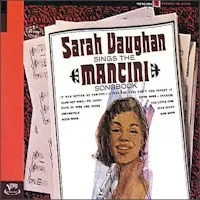Time: 33:38
Size: 77.0 MB
Styles: Jazz vocals, Standards
Year: 1965/1998
Art: Front
[2:41] 1. How Soon
[2:38] 2. Days Of Wine And Roses
[2:53] 3. Dear Heart
[2:50] 4. Charade
[3:47] 5. Too Little Time
[3:49] 6. Dreamsville
[1:51] 7. Bye-Bye Theme From Peter Gunn
[2:50] 8. Moon River
[2:29] 9. (I Love You And) Don't You Forget It
[3:37] 10. Slow Hot Wind
[2:26] 11. Mr. Lucky
[1:44] 12. It Had Better Be Tonight
Sarah Vaughan's contribution to the female jazz vocal genre, during the twentieth century, puts her alongside the likes of Dinah Washington, Billie Holliday and Ella Fitzgerald. As a child Sarah Vaughan sang in church and had extensive piano lessons from 1931-39, which helped her become a capable keyboardist. After she won an amateur contest at the Apollo Theatre, she was hired for the Earl Hines big band as a singer and second vocalist. Unfortunately, the musicians' recording strike kept her off record during this period (1943-44).
When lifelong friend Billy Eckstine broke away to form his own orchestra, Vaughan joined him, making her recording debut. She enjoyed her time with Eckstine's orchestra, where she became influenced by a couple of his sidemen, Charlie Parker and Dizzy Gillespie, both of whom had also been with Hines during her stint. Vaughan was one of the first singers to fully incorporate bop phrasing in her singing, and to have the vocal chops to pull it off on the level of a Parker and Gillespie. During the 1950's, Sarah recorded middle-of-the-road pop material with orchestras for Mercury, and jazz dates (including a memorable collaboration with Clifford Brown) for the label's subsidiary, EmArcy.
When lifelong friend Billy Eckstine broke away to form his own orchestra, Vaughan joined him, making her recording debut. She enjoyed her time with Eckstine's orchestra, where she became influenced by a couple of his sidemen, Charlie Parker and Dizzy Gillespie, both of whom had also been with Hines during her stint. Vaughan was one of the first singers to fully incorporate bop phrasing in her singing, and to have the vocal chops to pull it off on the level of a Parker and Gillespie. During the 1950's, Sarah recorded middle-of-the-road pop material with orchestras for Mercury, and jazz dates (including a memorable collaboration with Clifford Brown) for the label's subsidiary, EmArcy.
Sarah Vaughan Sings The Mancini Songbook




















